Posts Tagged ‘Quad Cities’
This Year’s Volunteer Spotlights
Next week is Volunteer Appreciation Week, and we want to celebrate our amazing volunteers. Volunteers are more than just helpers — they’re catalysts for change. Every act of service, no matter how small, has a meaningful impact in the lives of those we serve. Our volunteers are the backbone of our work, helping us serve vulnerable communities around the Quad Cities.
Their dedication and generosity make a real difference in our families’ lives. We couldn’t do what we do without volunteers like Matthew and Autumn.
Matthew
Matthew heard about World Relief Quad Cities through various media sources.
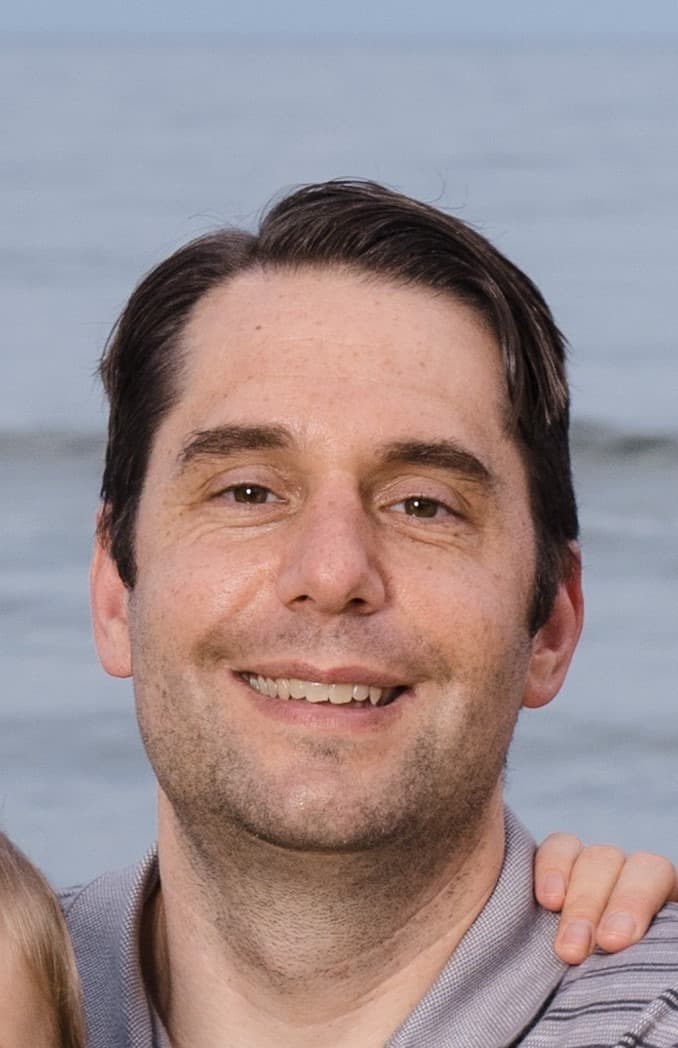
He deployed to Afghanistan in 2011 but never directly interacted with the local population. After the Taliban took control of Afghanistan in 2021, Matthew knew he wanted to get involved.
He supports helping all refugees, but because of his time overseas, he was especially interested in helping Afghan refugees.
“Volunteering through World Relief Quad Cities was a way to have more direct engagement with the Afghan people,” he said.
Matthew said volunteering has changed him because he can see the results. He knows exactly how his contribution helped the refugees because he “met the people directly.”
One of his favorite memories of volunteering is helping families complete their asylum interviews in Chicago. He remembers how excited they were during the trip.
He recalled some sharing traditional Afghan food while others took photos of the tall buildings in the city. “A woman who knew little English suddenly exclaimed ‘I love Chicago!’,” he said.
Initially, Matthew’s biggest concern was the language barrier. And although language may be a challenge, he learned that many of those he worked with were very tech savvy and have great learning capacity themselves. He said that many seem “grateful to be here.”
Autumn
Autumn has volunteered at World Relief Quad Cities for about 8 years. She first heard about volunteer opportunities from the volunteer coordinator at the time, Kelly, when she spoke at the Quad Cities Prayer Center. She started volunteering soon after.
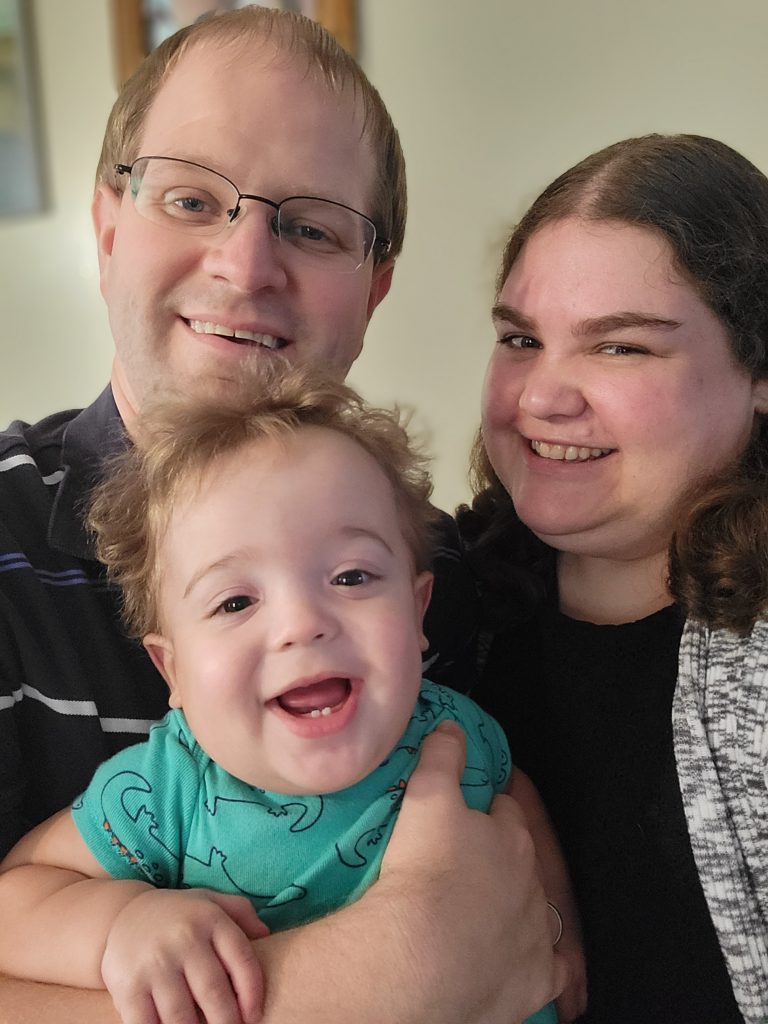
She suddenly found herself with “a lot more free time” when her life situation changed.
When she heard about the opportunity to help refugees in ways that fit her talents and interests, she knew that volunteering would be an impactful use of her time.
Autumn has gained many insights during her years of volunteering.
“I have learned new perspectives and experiences from the many different cultures I’ve worked with over the years. It’s given me more courage to seek out people who are different from me and learn their holidays, customs, foods, and celebrations,” she said.
She became particularly close with two families. She has many fond memories with them, but the best was hearing their joy as they got their U.S. citizenship.
“Seeing where they started in the U.S. to where they were headed was so amazing,” Autumn said.
She’s also learned to trust in others and ask for help when life gets hard. “We aren’t created to go through all of life’s struggles alone,” she ended.
Read the rest of Autumn’s story here.
To Matthew, Autumn, and every volunteer who has dedicated their time to serving the vulnerable: Thank you for choosing to walk alongside our families. Happy Volunteer Appreciation Week from all of us at World Relief Quad Cities!
Learn more about opportunities to volunteer with refugees and other immigrants, or, fill out a volunteer application:

Erica Parrigin manages grant writing and communications at World Relief Quad Cities. She graduated from Western Illinois University with a BA in English during the pandemic in 2020. She believes that stories are powerful, and that finding ways to empathize with others is the first step in making a difference.
World Relief Quad Cities Awarded $150,000 Grant to Break Down Barriers to Economic Advancement for Immigrants & Refugees in Rural Communities
FOR IMMEDIATE RELEASE
CONTACT: Pinkston Team
wr@pinkston.co
QUAD CITIES (March 22, 2023) — World Relief Quad Cities is the recipient of a $150,000 grant by Jobs For the Future (JFF), Ascendium, and World Education Services (WES) Mariam Assefa Fund, a group of funding organizations working together to advance economic inclusion for immigrants, refugees, and migrant workers in rural areas. World Relief Quad Cities is one of 10 newly-selected members of the Rural Immigrant Success Exchange (RISE), an ambitious two-year initiative that will convene a cohort of organizations working across the country to break down barriers to education, training, and employment for immigrant and refugee workers residing in rural communities.
Across the country, immigrants play a key role in rural communities facing economic decline, an aging workforce, and youth migration away from these geographies. Yet current research shows a too often unstable and unsafe entry point for immigrants, refugees, and migrants in rural areas, making access to quality jobs and economic advancement a significant challenge.
Refugees and immigrants are a vital part of the QC area’s workforce. Not only do they increase retention rates and help diversify the workplace, but with upskilling and/or re-skilling services, they also fill talent gaps in career fields such as interpretation and translation, security, logistics and driving, construction, engineering, sewing, or business and entrepreneurship. However, limited experience and low English proficiency often prevents employment in fields outside of labor-intensive, low-paying manufacturing positions. When refugee or other immigrant employees miss out on valuable opportunities to showcase their skills, so do local employers.
World Relief Quad Cities launched a Refugee Career Pathways program for Afghan entrants in 2022. With funding from JFF, World Relief Quad Cities has expanded the program to include all populations of refugees and other immigrants, with a focus on rural populations. The Refugee Career Pathways program provides career education and casework to equip participants with the skills they need to re-enter their career field, find and choose between career or education opportunities, and/or advance into highly-skilled fields.
“We are honored to be one of the organizations providing education and employment services to rural immigrants across the U.S. Through JFF’s RISE network, we can provide education and tools to improve economic well-being for clients choosing specific career paths to work toward during the program period. This funding is critical, and we are beyond excited to expand our Refugee Career Pathways programming to non-Afghan immigrants and refugees in the QC area,” said Grace Fitzpatrick, Director of Empowerment Programs.
RISE will support 10 organizations as they innovate and scale best-in-class workforce development, education, and training services for rural refugee and immigrant populations over the next two years. Through the network, RISE hopes to catalyze these best practices and lean into peer learning that will inform future work and funding opportunities in the field.
The 10 RISE finalists were selected through a highly competitive and comprehensive application process, yielding more than 100 initial applications. The competitive nature of the process demonstrates the growing need to support immigrants, refugees, and migrants living in rural communities and working in low-income jobs.
Read more about the 10 organizations that make up RISE.
WRQC will host a Refugee Workforce Job Fair with IowaWORKS, the Iowa Bureau of Refugee Services, and the QC Chamber of Commerce for employers to connect directly with refugees and other immigrants on both sides of the river. May 18, 2023, 11:00AM – 1:00PM, located at Scott Community College, 101 West Third St. Davenport, IA 52801, in the Community Room. Contact Grace at gfitzpatrick@wr.org to register.
About World Relief
World Relief is a global Christian humanitarian organization that brings sustainable solutions to the world’s greatest problems – disasters, extreme poverty, violence, oppression, and mass displacement. For over 75 years, we’ve partnered with churches and community leaders in the U.S. and abroad to bring hope, healing and transformation to the most vulnerable.
###
More than Disaster: International Women’s Day
Residents of Turkey and Syria face a perilous winter as freezing rain and low temperatures worsen the earthquake’s impact on vulnerable residents. As this International Women’s Day occurs amid one of the most devastating natural disasters to date, it also comes with an urgent need for recognition of the issues that disproportionately affect women in times of crises.
During the disaster, cultural norms may make it more difficult for women and girls to run away from danger, such as a collapsing building. Indoor childcare roles, modest dress, and gendered recreational activities mean that women and girls are less likely to have the ability to escape.
Then come the gender-based barriers that affect their wellbeing post-disaster. With the overall greatest needs being shelter, water, power, blankets, non-food and hygiene items and counseling, other needs are not always recognized as such. For women, a lack of sanitary items and maternal health care make it extremely difficult to navigate their devastated environment.
Humanitarian organizations on the ground in Turkey and Syria have warned that no internal resources exist for sanitary products, pregnancy, or breastfeeding. Pregnant women are especially vulnerable; the UN estimates that at least 226,000 pregnant women are at risk and expects around 25,000 to give birth in the next month. Women are unable to access medical or maternal care because hospitals and health clinics have been mostly demolished.
This also means that women experiencing gender-based violence are unable to seek help. Violence against women and girls is a factor in all disaster scenarios. In stressful environments, they are often alone or caring for other vulnerable people (children, the elderly, the injured, sick or individuals with disabilities). Shelters in open and overcrowded areas carry additional threats to women’s safety. Without their own space and separate toilets, women and girls are at an alarming risk of exploitation. Those who were already struggling to rebuild their lives after being internally displaced multiple times due to conflict in Syria are at the greatest disadvantage.
Fortunately, in recent years, data from the UN and UNHCR has led initiatives to become more inclusive of women’s needs. The UNFPA, for example, is working to re-establish safe spaces for women and girls to prevent gender-based violence in Turkey and Syria. Other disaster response organizations are prioritizing women’s safety by providing reproductive health services, mobile hygiene trailers and dignity kits wherever possible.
Women and girls who have been displaced are relying on us not to look away from the reality of humanitarian crises. Much work needs to be done to help ensure their safety. For those of us in the U.S., it can be hard to understand the level of devastation occurring overseas. As our partner organizations respond to needs on the front lines, we can help prepare safe, welcoming environments for displaced women through our compassion to stay informed.
See what you can donate to help prepare homes for newly arriving refugees, or support World Relief partners on the ground in Turkey and Syria:

Erica Parrigin manages grant writing and communications at World Relief Quad Cities. She graduated from Western Illinois University with a BA in English during the pandemic in 2020. She believes that stories are powerful, and that finding ways to empathize with others is the first step in making a difference.
9 Things You Need to Know About Private Sponsorship
On January 19th, the Biden Administration announced a new private sponsorship program for refugees called The Welcome Corps. Through Welcome Corps, everyday Americans can directly sponsor refugees who are being resettled in the U.S.
Today, there are an estimated 103 million displaced people globally, including 32.5 million refugees. Forced from their homes and separated from support networks, refugees are among the world’s most vulnerable populations.
At World Relief, we know you want to live out Jesus’ call to welcome the stranger and care for those experiencing vulnerability. Private sponsorship builds on World Relief’s existing opportunities that engage local communities in welcoming newcomers and is one more way you can answer that call. Here are 9 things you should know about private sponsorship and how you can get involved.
1. What is The Welcome Corps?
The Welcome Corps is a new private sponsorship program from the U.S. government that allows groups to sponsor and resettle refugees. Sponsors will play a key role in welcoming, supporting and assisting refugees as they rebuild their lives in the U.S. and integrate into their new communities.
2. How do I become a sponsor?
Becoming a private sponsor is a multi-step process that includes forming a group of five or more individuals, submitting an application, background checks, demonstrating sufficient financial resources and more. Currently, private sponsors can apply to be matched with someone in need of sponsorship. The U.S. government is also working to roll out an option for people to sponsor specific individuals they already know who are in need of resettlement from another country. To learn more and begin your application process, click below!
3. Who is eligible for resettlement through the Welcome Corps?
This new program will be implemented in phases. In its first year, Welcome Corps’ goal is to mobilize at least 10,000 Americans to help at least 5,000 refugees, and then scale up to make the program an enduring feature of the refugee resettlement system.
The first refugees who will be assisted by private sponsors through Welcome Corps are expected to arrive in April 2023 and will primarily come from countries in Sub-Saharan Africa.
4. If I become a sponsor, what will I do?
Sponsors assume responsibility for initial resettlement services, providing financial and other forms of support as required by the refugee resettlement process. Some examples of non-material support include:
- Meeting the refugee(s) upon arrival in the United States and transporting them to initial housing
- Ensuring that the sponsee has safe and appropriate housing and basic necessities
- Ensuring that the sponsee’s healthcare and medical needs are met for the duration of the resettlement period
- As appropriate, helping the sponsee complete the necessary paperwork for employment authorization, a Social Security card and for any other public benefits for which they may be eligible
- As appropriate, assisting the sponsee with accessing education, learning English and enrolling children in school
- Supporting employable sponsees in securing employment in the U.S. workforce
- Ensuring appropriate interpretation/translation
- Providing cultural and community orientations
For more information on the sponsorship process and what’s required of sponsors, visit welcomecorps.org.
5. Is private sponsorship good for refugees?
Private sponsorship opens more pathways for more people fleeing persecution to rebuild their lives and thrive. At World Relief, we applaud the expansion of sustainable, lawful opportunities for those fleeing persecution to find safety in the U.S.
Navigating the process of private sponsorship can also come with challenges for both sponsors and refugees. But you don’t have to face them alone.
At World Relief, we have decades of experience working with refugees and displaced populations across the globe through our various local community sponsorship and volunteer programs. We utilize this experience to equip churches and passionate people like you to walk alongside those who choose to welcome newcomers and the newcomers they are matched with.
If you are interested in private sponsorship or connecting with our Quad Cities or other U.S. offices, and would like to receive updates on how World Relief can support you in the process, please sign up here. In addition, we will send you a free code for our eLearning course “Navigating Friendships” which will help you learn how to build empowering, long-lasting friendships with those from different cultures.
6. Has private sponsorship been done elsewhere?
Yes! Private sponsorship has been a successful piece of refugee resettlement efforts in countries like Canada and Australia, and versions of private sponsorship have even been part of U.S. refugee resettlement historically. Most recently, the U.S. has re-engaged private sponsorship models to resettle people from Afghanistan, Ukraine, Venezuela, Haiti, Nicaragua and Cuba. This new program goes beyond existing private sponsorship programs providing a pathway to resettle refugees from around the world.
7. What about traditional pathways to refugee resettlement? Will refugees continue to be resettled by World Relief and other agencies?
Yes! The U.S. federal refugee resettlement program will continue to operate and World Relief will continue to offer various ways for churches and individuals to engage in welcoming refugees and other immigrants in vulnerable situations. Private sponsorship will complement the work already being done by organizations like World Relief, allowing more people fleeing persecution to find safety in the U.S.
8. Is World Relief assisting with private sponsorship?
Currently, World Relief provides other community sponsorship opportunities — such as our Good Neighbor Team program — through our local U.S. office locations. While we are not administering the private sponsorship program directly at this time*, we are eager to continue welcoming refugees, both through our own resettlement program and by discerning how we can best partner with and support the Welcome Corps. Additionally, we have resources already available to serve both sponsors and those being sponsored.
The World Relief Workshop is our e-learning platform designed to equip individuals, groups and churches to best serve their refugee neighbors — from courses on navigating common barriers to ESL tutoring. Many of our U.S. offices are also able to offer services to sponsees such as English classes and immigration legal services.
*To receive updates on World Relief’s involvement with private sponsorship + a free Workshop course, sign up here.
9. I’m not ready to become a private sponsor. Is there anything else I can do?
Yes! As mentioned, World Relief works with refugees and displaced people in the U.S. and all over the world and offers the opportunity to welcome and walk alongside refugees and other immigrants through local volunteer and sponsorship programs.
You can support this work by volunteering with World Relief Quad Cities or making a donation to World Relief. Your gift will allow World Relief to provide job training, legal support and more for immigrants and refugees right here in the Quad Cities. Together, we can extend welcome and address the root challenges that lead to displacement in the first place.
Hope in the Tension of Waiting
Dear Church Leaders,
The peace of Christ to you! Advent is in full swing—and Christmas is around the corner. What feelings does this season stir in you and your congregation—excitement, sorrow, joy, stress?
Rhythms change a bit this time of year, freeing many of us up to gather with loved ones. Personally, I am really hoping for both good connection and down time. I also recognize that for many, broken relationships highlight that all is not right. This season actually hurts.
Refugees also know the pain of separation from community rhythms—when the comfort of being with loved ones at home is replaced by only memories and tears. “Will my life ever feel normal again?” so many wonder as they work to adjust to a new land.
Until God’s promise of the new heavens and earth is made complete, and all the complexities of our broken relationships and systems are healed, our world waits in this tension. No matter how much technological and social progress we make, there lingers a shared sense that not all has not been made fully right yet.
We wait in tension—we qavah—for wholeness.
Living on the margins of society, Mary knew this tension well. Picture her in your mind—the humble, Jewish adolescent, displaced and pregnant, her family heavily taxed by Caesar Augustus, the self-declared son of god. Between the Old and New Testaments, Yahweh had been silent for 400 years. In Mary’s day, all did not feel right.
Her song proclaims a bold hope amidst this tension of waiting: At last! He has come to save us from our brokenness—and to defeat the powers that oppress us. Her voice cries out: Finally! Hope for the humble, the poor and the forgotten of His people. At last, the long-awaited sign! Yahweh’s ancient promise to Israel of salvation and justice is coming true.
Like Mary and our ancestors of faith,we may not know exactly how God will complete this work—and actually, we may not have evidence that circumstances will get better before they get worse. At times, we look around at our churches and communities, stuck in complexity and crisis we cannot fix. But like the prophets declared, our hope is rooted—not in the state of the world or our odds at progress—but in the very person of Jesus Christ. His faithfulness in the past gives us hope for the future He has promised. That one day at last, He will finally rescue us—and the whole creation—from decay and death.
As we wait for King Jesus to come again, we can lean deeply into hope that is rooted—not in summoned optimism or holiday cheer—but in the very character of God who makes good on His promises.
This hope gifted to Mary and to our forefathers is the same hope given today to displaced refugees—and to you and me. Praise the Lord—we need it now as much as ever.
During Advent, I invite you to reflect: who do you know that needs to be invited afresh into this bold, enduring hope?
May the Lord infuse your heart with it this day,
J. Mark Bowers
for all of us at World Relief
Feeling inspired to get involved? See what you can donate to create safe, welcoming homes for refugees – and above all, hope.

J. Mark Bowers is Sr. Training Advisor at World Relief, building our capacity to help churches become places of welcome wherever they are.
Christmas in a Myanmar Village
Sweet December
During the month of December, a deep Christmas spirit erupts to fill every corner of Hanna Niang’s village. The crisp winter weather is a joyous gift after months of heat and rain, and at night, Christmas decorations twinkle in harmony with the sounds of youth caroling from door to door.
Niang’s village lies near the Chin State. The Chin State is home to many communities of Chin people, and you can often find an entirely different language or culture in just the next town over. Niang herself is Zo Chin.
The holiday season begins with a celebration called “Sweet December,” celebrated on December 1st. For Niang’s family, it’s a time to gift and eat sweets, gather at church for worship, and follow the program until the youth take over with activities or lighthearted pranks.
“There’s always a comedian, you know… they might perform, tell jokes. One time I remember the youth asked the pastor to dress in a silly way he never dressed before. We always have a lot of fun,” she says.
The day ends with a dinner of milk tea and sticky rice.
Preparations
According to Niang, celebrating Christmas in the village is much more fun than it is in the city. The village has unlimited space for locals to play music “as loudly as [they] want.” Chin State Christians account for 85% of the 6% of Christians living in Myanmar, so there are plenty of people to join in the celebration (although Buddhists and Muslims are always invited to celebrate in their “own way”).
In the city, there’s less space, more neighbors concerned about volume, and it’s hot.
Christmas is celebrated outside. The pastor, elders, youth, and the women’s group of the church begin planning months in advance. Before Christmas Day, the church will construct a large bamboo or wooden frame to serve as a pavilion. Although there’s rarely more than a dusting of snow, dried rice leaves are then used to line the floor, ceiling, and walls, which may also be reinforced with a tarp to prevent eager children from jumping through.
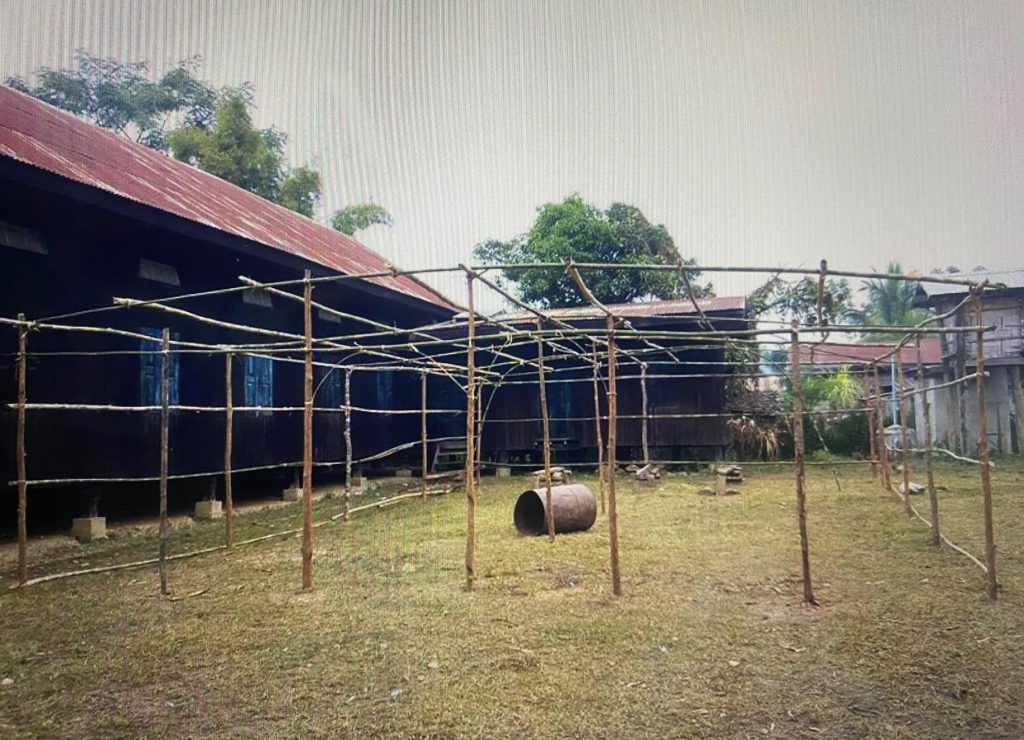
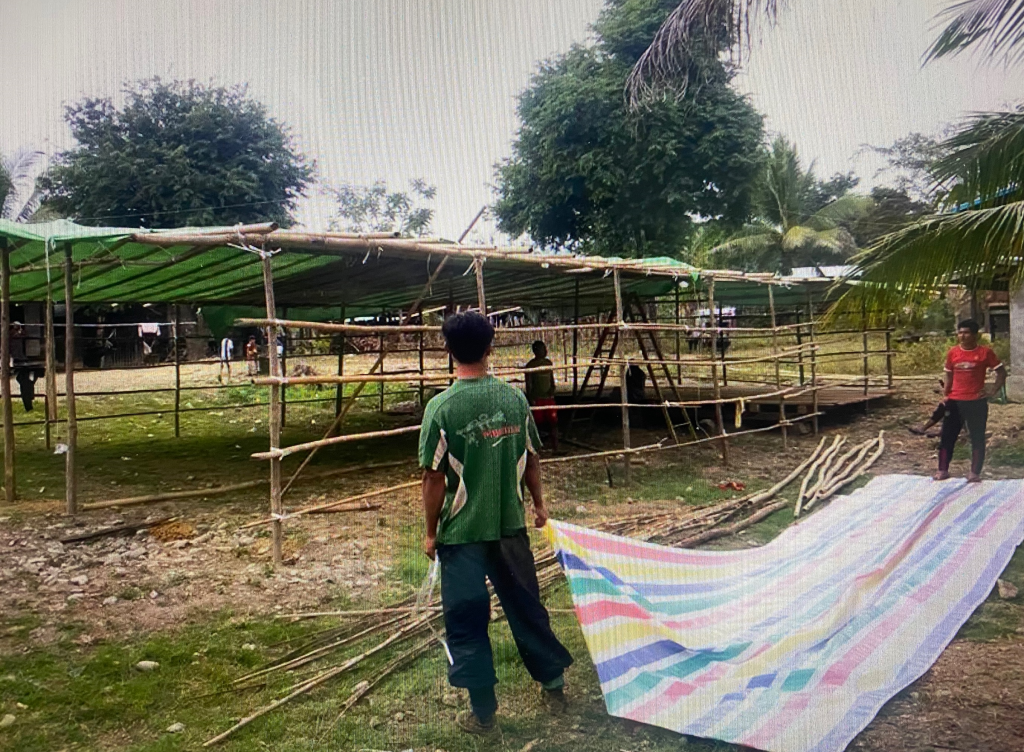
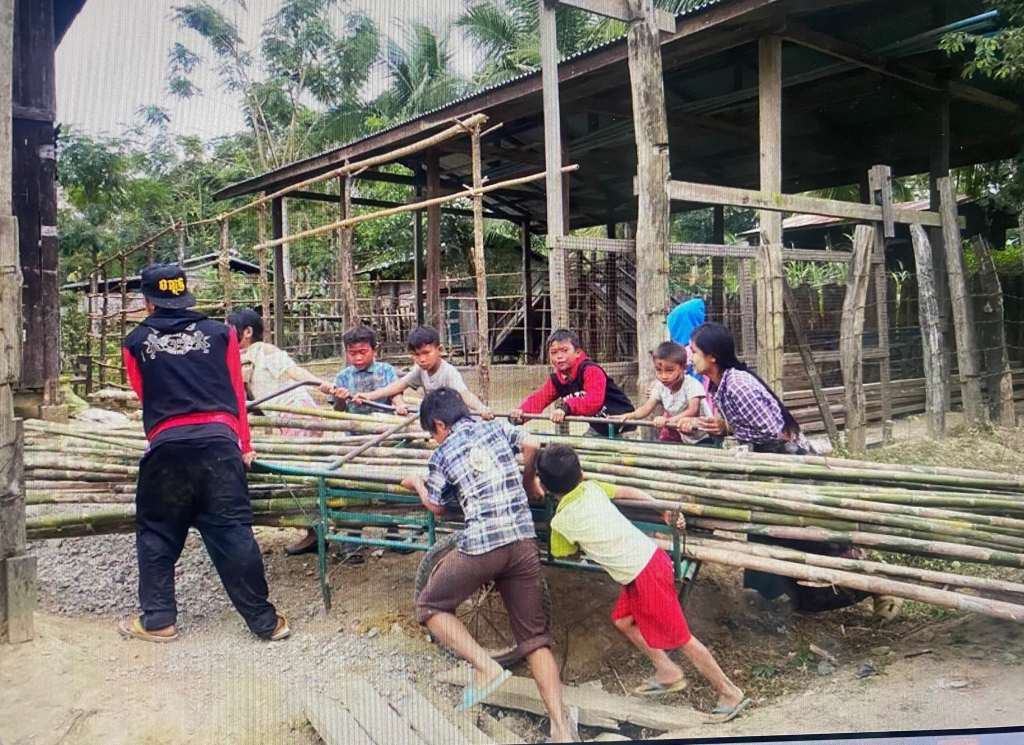
No table is long enough to seat every person, so the church prepares a long wooden buffet where everyone sits and shares their meal. Both are temporary structures which are burned for easy takedown after the event.
Christmas Day
One long road lined with houses stretches the village. On Christmas Day, the houses become shops. Each home offers something different, from traditional food like porridge to chips that are sour, spicy, or sweet. Sometimes owners already have permanent stores in front of their house. Those who want to sell but don’t have a house by the road ask a relative to sell on their property.
“Imagine Avenue of the Cities,” Niang says, “one road with shops that everyone walks on. There’s a lot of conversation about ‘what are you going to do, what are you going to sell.’”
“And if you’re the relative, you might get to eat some of what is being sold,” she gladly adds.
At the event, everyone is treated to both lunch and dinner. Families most often bring their own rice to accompany their food and milk tea. Children often roll their rice into a ball to carry while they play hide and seek. People coming from the Chin State don’t grow rice, so they bring corn instead.
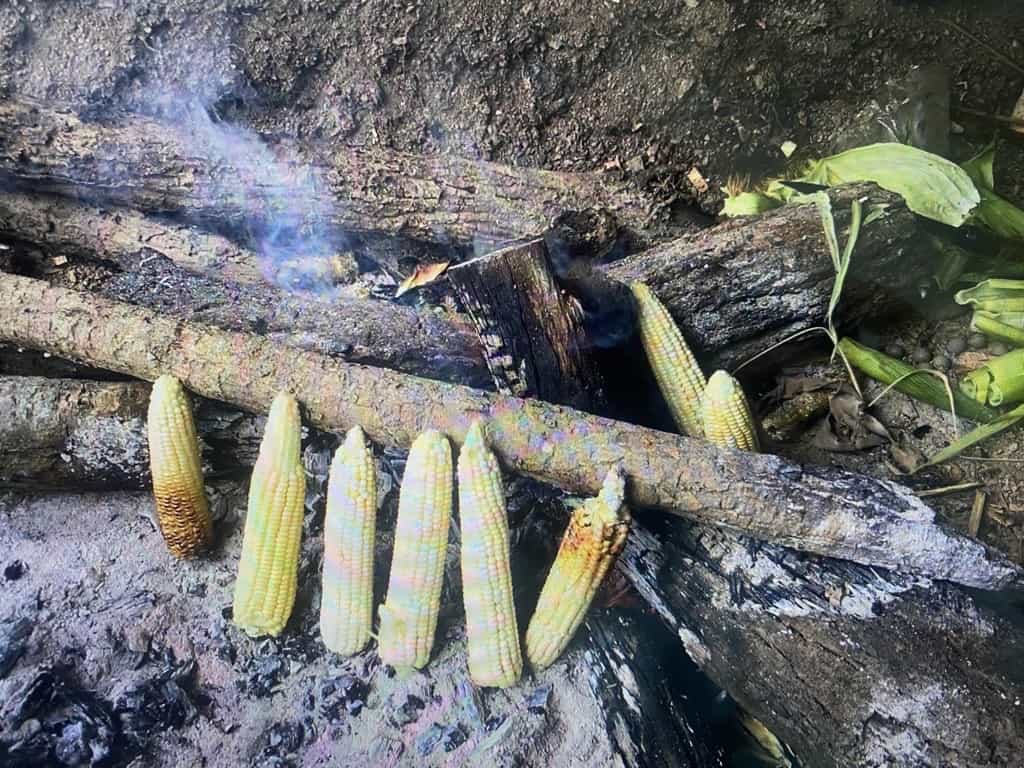

The most famous dish is made from sticky rice cooked in a bamboo stick and grilled on a barbecue.
“Everyone has a different name for it, but Zo Chin call it ‘Bom Dan.’ We have black and brown bamboo, some people will put filling, like red beans,” Niang says.
Between meals, there’s dancing, singing, games, and worship. Lively conversation fills the air from all directions. Everyone is excited to come together, celebrate, and share blessings with one another – not as individuals, but as a community.
From Myanmar to the U.S.
Church members most often choose to divide event costs among themselves, even if they are overseas and not able to join the celebration. Depending on the church’s needs, members may donate drinks, rice, or meat like pork, cow, and ox.
In 2019, Niang’s family took over the costs for their church’s celebration in Myanmar despite living in the States.
U.S. culture is a whirlwind of future tense, and it comes as a shock to those experiencing their first Christmas after resettlement. With everyone thinking hours, days, even weeks ahead, lively celebration is replaced with small, formal service; Christmas is celebrated with immediate family rather than the community as one. Few have time to stay and chat, let alone celebrate through the night.
“When we celebrate, we celebrate as a community, with community.” Niang says. “Here, we’re thinking about work instead of celebrating. And another thing is gifts.”
Gift giving isn’t nearly as central in Myanmar as it is in the States. Santa Clause doesn’t visit Niang’s village. Instead, it’s customary to give gifts like money or clothing to church elders or others involved in the church. Parents will buy their children new clothes, typically the only clothes they receive for the year. Christmas attire is an early decision and a special outfit is reserved early in the year, often in red, white, or green.
“My people are similar to Native Americans,” she says. Sometimes they dance around the fire to the beat of a hand drum or put on traditional clothes, although they’re not as “showy” as they used to be. And although younger people will sometimes indulge in homemade rice wine before the event, they respect the church’s boundaries.
“We celebrate Christmas as Christians, but we always keep tradition,” she says.
Niang’s church hasn’t celebrated Christmas for three years because of COVID. She’s not sure if they will celebrate this year, but she’s hopeful. Meanwhile, she suggests that others in the U.S. slow down, stay present, and “enjoy life” this Christmas season.
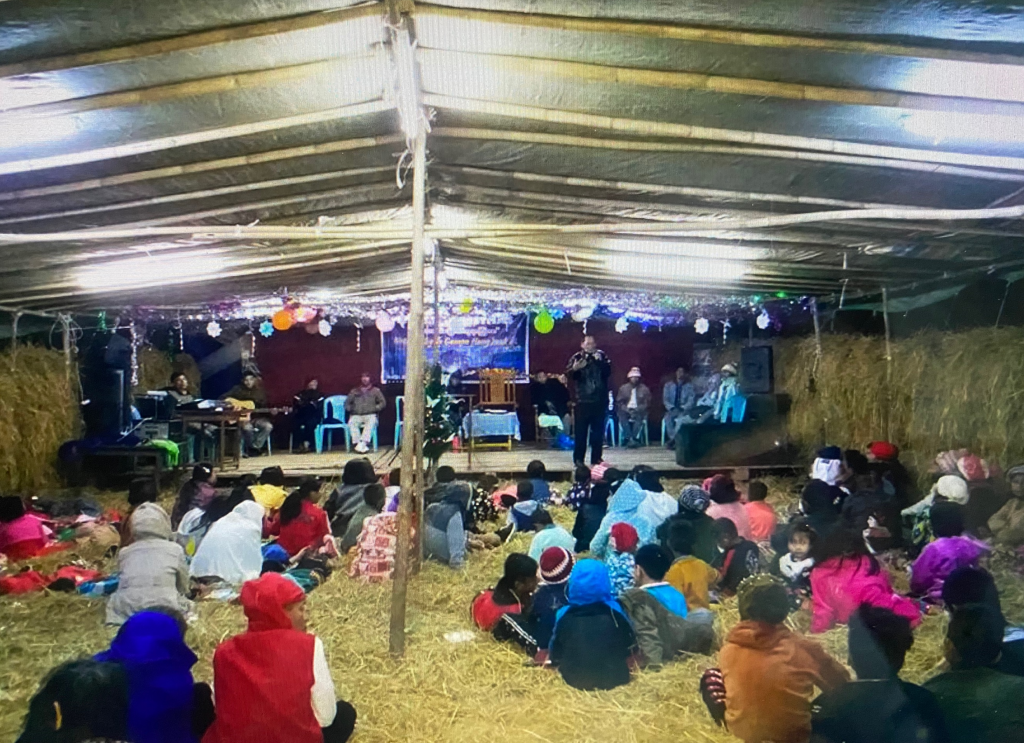
Merry Christmas, ပျော်ရွှင်သောခရစ္စမတ်ဖြစ်ပါစေ
Want to help a family experiencing their first Christmas in the U.S.? See what you can donate, or, consider making a financial gift:

Erica Parrigin manages grant writing and communications at World Relief Quad Cities. She graduated from Western Illinois University with a BA in English in 2020. She believes that stories are powerful, and that learning to empathize with other perspectives is the key to making a difference.
Refugee Employees Celebrate 10 Years at XPAC
“Where am I going to find work?” is a question that weighs heavy in the minds of refugee arrivals. Over the last 10 years, XPAC has led hundreds to gain peace of mind and self-sufficiency through employment.
The decision to become an employment partner with World Relief Quad Cities came in 2011.
“The relationship . . . has continually grown and exceeded our wildest imagination,” said Denise Kelly, Director of Human Resources at XPAC. “It’s such a success.”
XPAC (originally Export Packaging Company) began in 1974 as a small pallet and crating company with about 50 employees. Today, XPAC staffs around 1300 employees, specializing in customized logistics and supply chain management solutions.
Many are current or former refugees. As their English improves and they adjust to the workplace, more opportunities become available.
“We have several refugees who have been promoted, even multiple times, all the way to supervisory positions. They are eager to succeed and lead,” Denise said.
When other members of the refugee community see the success that current ESL (English as a Second Language) employees have, it inspires them to push through their adjustment period. This year, seven employees celebrated 10 years with XPAC, in addition to the five who celebrated their 11 years in 2021.
It’s a special thing to stay with a first job in a new country, or at all. But XPAC’s successful retention of WRQC clients goes beyond the opportunities they provide. It’s also about the environment.
“XPAC employees continually say that next to their own family, their XPAC family is a close second,” Denise said. Because the workplace culture has roots across the Quad Cities population as a whole, it makes for a particularly welcoming scenario.
A necessary element in the partnership is adaptability. WRQC Employment Services Director, Grace Fitzpatrick, says the biggest challenge in accommodating refugees into a workplace is the language barrier.
“Employers have valid concerns about training and safety if no interpretation is available,” Grace said, “XPAC has done a great job of hiring and promoting bilingual staff to adequately train new hires and keep everyone up to date on safety precautions.”
Another common hurdle when hiring refugees is transportation. Since XPAC has been hiring refugees for over 10 years now, there are plenty of ridesharing opportunities, even bus lines.
Refugees bring good attitudes and culture to any work environment. The desire to “find their footing” and “rebuild their lives” shows in their work ethic.
Many even become inspired to help others following in their footsteps. “When I see refugees that are comfortable with the working conditions, opportunities, pay, and loyalty we show to them, and they refer their family members [or] friends, it’s the best compliment XPAC could ever have,” Denise concluded.
Here’s to changing the lives of new refugee arrivals for years to come.
Visit our employment page to learn more about our work.

Erica Parrigin manages communications at World Relief Quad Cities. She graduated from Western Illinois University with a BA in English in 2020. She believes that stories are powerful, and that learning to empathize with other perspectives is the key to making a difference.
World Relief Quad Cities Announces Partnership With Quad City Symphony Orchestra to Celebrate Music Across Cultures
11/18/2022
CONTACT:
Baylee Lakey
baylee.lakey@pinkston.co
580-374-1734
QUAD CITIES (November 18, 2022) – World Relief Quad Cities (WRQC) announced today its partnership with Quad City Symphony Orchestra (QCSO) to present the musical programming series Masterworks III: Ode to Guitar on December 3, 2022 at 7:00 p.m. and December 4 at 2:00 p.m. at the Adler Theater.
Through the partnership, WRQC and QCSO aim to bring people together around the power of music, while giving back to refugees in the process by donating 50% of ticket proceeds to support immigrants and refugees in the local community.
“At a time when our communities are in need of connection, this program will bring people together to celebrate music across cultures,” said World Relief Quad Cities Executive Director Laura Fontaine. “World Relief Quad Cities is thrilled to join the Quad City Symphony Orchestra in telling the story and recognizing the critical contribution of immigrants and refugees in our society. We are thankful to QCSO for their support in giving back to our immigrant and refugee communities in the region.”
The program will feature acclaimed guitarist Mak Grgić and composer Michael Abels, along with narrator and local TV anchor Jim Niedelman. In the concert, Grgić is joining the QCSO to premiere a QCSO co-commissioned Guitar Concerto “Borders” composed by Abels.
“This piece is inspired by the museum exhibit ‘Sahara: Acts of Memory’ by Amir Berbic depicting life in camp ‘Sahara’ that was created in Denmark for housing refugees of the Bosnian War in the 1990s,” said Composer Michael Abels. “Among the refugees were graphic artist Ismet Berbic and his family. The exhibit details the Berbics’ struggle to preserve individuality, family and cultural identity in the face of losing country and community. Guitarist Mak Grgic is a friend of the Berbics, and experienced the Balkan war firsthand as a child. In the first movement of this concerto, the guitar is a protagonist that is repeatedly confined by sonic bars or walls created by the orchestra. The second movement depicts a child running, sometimes joyfully, but also sometimes in fear.”
“When Michael and I first started talking about the narrative of the new guitar concerto, we couldn’t help but notice that we both came from turbulent backgrounds and that music had provided a safe haven for us,” said featured Guitarist Mak Grgić, an immigrant himself. “It was a sheer coincidence that around the same time, my friend Amir Berbic had an exhibit in Pomona, California, about his family’s experience as refugees during the Balkan War in the 1990s. We visited Amir’s exhibit Sahara: Acts of Memory together, and it touched us both deeply, providing further inspiration for Michael’s writing of the concerto, which took on the title ‘Borders’. I am beyond thrilled that we chose to present music as something that supersedes life’s obstacles, and that the Berbic family’s story of persistence and perseverance has been told so well.”
Tickets to the performance are on sale now and can be purchased on the QCSO event page. To give back to World Relief Quad Cities with your ticket purchase, the code WRQC can be entered on the discount code page of the check-out process.
About World Relief
World Relief is a global Christian humanitarian organization that brings sustainable solutions to the world’s greatest problems – disasters, extreme poverty, violence, oppression, and mass displacement. For over 75 years, we’ve partnered with churches and community leaders in the U.S. and abroad to bring hope, healing and transformation to the most vulnerable.
###
Honoring our Immigrant Neighbors
For the Lord’s sake be subject to every human authority, whether to the emperor as supreme or to governors as sent by him to punish those who do wrong and to praise those who do right. For it is God’s will that by doing right you should silence the ignorance of the foolish. As servants of God, live as free people, yet do not use your freedom as a pretext for evil. Honor everyone. Love the family of believers. Fear God. Honor the emperor.
I Peter 2:13-17
Peter, writing to Christians in Rome, offers advice on navigating Roman culture. He affirms the role of government to ensure social order, but then encourages them to use their Christian freedom in positive ways. He ends by telling them to honor everyone, including the emperor.
So, what does this have to do with immigration? Too often the immigration conversation seems like a choice between immigration reform and border security. On one side, it’s assumed that support for immigration reform is to be for open borders. On the other, there’s the assumption that insisting on border security means they have no compassion for immigrants and refugees.
The reality is meaningful immigration reform must include measures to help secure the border. At the same time, making it easier to come to this country legally will greatly diminish the need for people to break the law.
Peter tells us we are to honor everyone, regardless of social status. Notice how this text flattens social status. Everyone is due honor—not just citizens, the wealthy, the employed, or leaders… everyone. In this way, the emperor is on the same level as the common person.
All people deserve respect and dignity because we are all created in the image of God—there can be no favoritism. James says the same thing:
“My brothers and sisters, do you with your acts of favoritism really believe in our glorious Lord Jesus Christ?”
James 2:1
Undocumented immigrants and asylum seekers deserve honor and dignity. Immigrants are vital member of our communities who deserve an opportunity to get right with the law, to come out of the shadows.
Congress has the power to reform our immigration system by passing laws that make it easier for people to come to this country. Congress has the power to provide a pathway to citizenship for Dreamers, and to provide a pathway to status for undocumented immigrants.
Ask our leaders to rebuild the asylum system to welcome and support refugees into this country. This is an important way we can honor our immigrant neighbors. When we do this through the proper channels, we “honor the emperor”—we recognize the importance of institutions and laws to preserve the social order.
Our legislatures have the power to enact reform if we have the will to step outside of our ideological camps (both conservative and liberal) and use government to meet the needs of others. We can provide border agents with the resources and tools they need to make sure criminals and terrorists are kept out of our country. In listening to border agents, it’s clear this doesn’t have a be a wall. Instead, more human power, technology, and increased legal pathways are the way to a secure border.
As Christians living in the United States, Peter instructs us to use our Christian freedom for good and not for evil. We can use the cultural power of our government to seek the flourishing and wellbeing of our immigrant neighbors. Consider contacting your member of congress and your senators. Ask them to support immigration reform that is bi-partisan, honors our immigrant neighbors, and upholds the importance of the rule of law.
Inspired to get involved in the conversation? Sign up for our six-week advocacy classes using “Welcoming the Stranger” by Matthew Soerens and Jenny Yang.
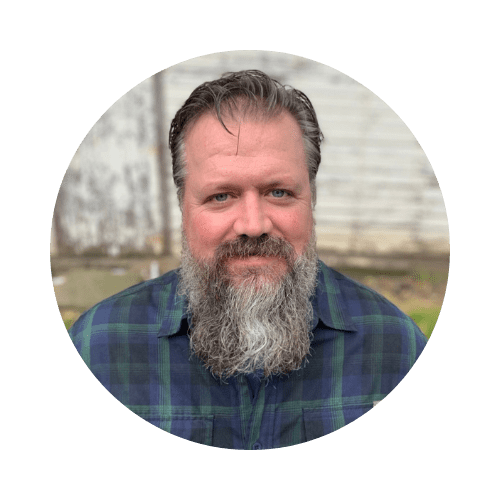
Jason Lief lives in Sioux Center, Iowa and works for the National Immigration Forum as a Bibles, Badges, and Business Immigration Mobilizer.
Email: jlief@bbbimmigration.org
Giving Thanks
2022 has been a long year. Too often, it feels as though the crises are never-ending, leaving many of us sad, frustrated and confused. When feeling overwhelmed, it’s important to take a step back and remember the things that heal us. Here’s what our team is grateful for this year.
I’m thankful for my girls’ amazing teachers, and especially thankful for Black Hawk Area Special Education.
Leah
I’m thankful to work for a pro pregnancy and pro momma office.
Habie
I am thankful for God’s goodness to me, for good health, for my family and friends. I am thankful for my daughter and being able to see her grow, and most of all, I am grateful for being alive today.
Chantal
I’m grateful for all my coworkers. Since I started working with them, I’ve learned a lot from them. Lastly, I’m grateful for being able to work at WRQC because it gives me the chance to serve and help our people. I feel like I’ve made a small difference in someone’s life, and that’s the greatest gift you can give to some.
Pascal
I am thankful for God’s blessing upon my family.
Paw
I’m thankful for the upcoming arrival of our first child and a work environment that’s been so supportive of me and Beth as we plan for her arrival.
Spencer
I am thankful to Allah (God) for giving me life this year.
Amir
I am thankful that I get to work every day with a staff that feels like family and for volunteers who pour so much of themselves into our families, ensuring they feel safe and cared for.
Beth
I’m thankful for my husband’s unwavering support, to have a group of friends who can uplift one another from miles away, and to have a job where I can watch as my work makes a difference. I’m also grateful for my genuinely kind colleagues, who offer wordless but empathetic support in the form of coffee or food during long writing hours when I can’t step away.
Erica
I am thankful of the role that lets me serve the people in need.
Najib
I am thankful for my family. I am thankful for the job I have as I get to do what I love.
Ratko
I am thankful for everything, but most importantly my family and my mother that live in Malaysia; to love and to be loved by them is a blessing. Also thankful to work with wonderful people in WRQC; wonderful leaders, wonderful team.
Hanna
I am thankful for good music.
Bekzod
Words will never be able to capture how grateful I am for the entire team at World Relief Quad Cities. The dedication, passion, and love is seen everyday through all the work and support they give to our families. It is an honor to lead and work alongside a team that is dedicated to fulfilling a mission and calling to serve refugees. My heart is filled with thanks and appreciation for all the volunteers that have put in countless hours to help us accomplish our work and welcome and love new families to the Quad Cities. I am humbled at the support we have received from our community. This Thanksgiving, I thank YOU!
Laura Fontaine, Executive Director
Thank you all for making the Quad Cities a welcoming and loving community where all people from all countries, faiths, walks of life, political and social views are accepted, loved, and treated as equals. Blessings to you and your family this Thanksgiving from the World Relief Quad Cities team.











